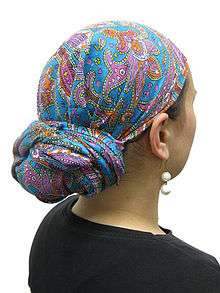Tichel
Tichel (Yiddish טיכל tikhl), also called a mitpachat (Hebrew מִטפַּחַת miṭpaḥat), is the Yiddish word for the headscarf worn by many married Orthodox Jewish women in compliance with the code of modesty known as tzniut, which requires married women to cover their hair.[1] Tichels can range from a simple plain color cotton kerchief tied in the back to elaborate head coverings using multiple fabrics and tying techniques.

Etymology
The Yiddish word tichel is the diminutive of tuch ("cloth"). Compare German Tuch ("cloth"), and the corresponding Bavarian diminutive Tiachal, Tücherl ("small piece of cloth").
Background
After the wedding ceremony, Orthodox Jews believe that a woman should only show her hair to her husband.[2] According to the Mishnah in Ketuboth (7:6), hair covering is not an obligation of biblical origin but is highly advised as many Jewish women used to wear it, and the Bible advises it, as we see in Genesis 24:64-65, Isaiah 47:2, and Song of Songs 4:1. It discusses behaviors that are grounds for divorce such as, "appearing in public with loose hair, weaving in the marketplace, and talking to any man" and calls these violations of Dat Yehudit, which means Jewish rule, as opposed to Dat Moshe, Mosaic rule. However, the Talmud on this Mishna explains that if the hair is completely uncovered in public, this would indeed be a violation of "Dat Moshe", and the Mishna is referring to one who cover her hair with a netlike covering where hair is visible through the holes, as in this case the Biblical requirement is met, but not the "Dat Yehudit".[3]. This categorization suggests that hair covering is not an absolute obligation originating from Moses at Sinai, but rather is a standard of modesty that was defined by the Jewish community. In Berakhot 24a), the rabbis define hair as sexually erotic (ervah), and prohibit men from praying in sight of a woman's hair. The rabbis base this estimation on a biblical verse: "Your hair is like a flock of goats" (Song of Songs 4:1), suggesting that this praise reflects the sensual nature of hair.
See also
References
- Encyclopedia of Judaism: Tichel
- All about Orthodox Jewish women
- Kesubot 72a-72b
